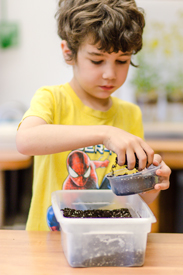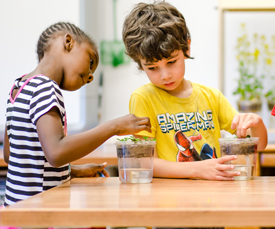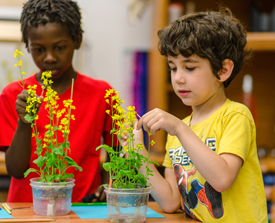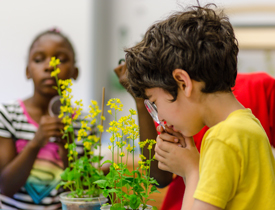While occupied by hands-on Fast Plants tending tasks in my role as co-director of the Wisconsin Fast Plants Program, I often listen to podcasts. Spoiler alert: I love podcasts about plants! No surprise, one of my favorites is Matt Candeias’ podcast, In Defense of Plants. Beyond my fascination with the wide array of topics Matt dives into in his podcasts, I appreciate Matt’s perspective on the importance of learning about plants–for all people. In an interview with Mary Williams of the American Society of Plant Biologists, Matt shared:
“My goal is simple – foster a love, appreciation, and sense of wonder for this botanical world with a focus on plants as organisms rather than as tools at our disposal.”
We’re hard-pressed to find a better-aligned goal with the mission of the Wisconsin Fast Plants Program. Accordingly, we share with much gratitude the following guest post, written by Matt, about the importance of hands-on learning with plants. Read on for some insights into Matt’s path to becoming a “botanizer” and his hopes for our youth, learning with plants. –Hedi
I am a hands-on learner. The more physical experience I have with something, the more connected to it I feel. That is why gardening is such an important part of my life. There is no better way to get to know a plant than to try and grow it. Even if your attempt ends in failure, you will still learn something. With a little determination, the n ext attempt or two may reward you with success.
ext attempt or two may reward you with success.
I will never forget my first exposure to growing plants. I was in the 4th grade and my teacher rolled in a big cart full of pots, soil, lights, and watering cans. I grew up in a family full of gardeners, but their gardens were theirs, not mine. This was going to be my first chance to grow a plant that I could call my own. My teacher sat us down and told us that we were going to be studying the lifecycle of a flowering plant. In addition to reading about the process, we were going to be witnessing it in real time. Even more exciting was the fact that she had purchased seeds of a tiny turnip cultivar called the Wisconsin Fast Plant.
 Many students moaned and groaned thinking this project was going to be as boring as watching grass grow but she assured us that these plants were indeed fast. We set about picking out and filling our pots with soil. Within the span of an hour, the lights were hung, the seeds were sown, and the pots were watered. I was far more interested in animals at this point in my life but there was something extremely satisfying about potting up my own seeds. My excitement for plants grew exponentially only a day or two later when the first cotyledons breached the surface and unfurled themselves.
Many students moaned and groaned thinking this project was going to be as boring as watching grass grow but she assured us that these plants were indeed fast. We set about picking out and filling our pots with soil. Within the span of an hour, the lights were hung, the seeds were sown, and the pots were watered. I was far more interested in animals at this point in my life but there was something extremely satisfying about potting up my own seeds. My excitement for plants grew exponentially only a day or two later when the first cotyledons breached the surface and unfurled themselves.
In a surprisingly short amount of time we had healthy, flowering Fast Plants for us to study in detail. I wish I could say this is what got me hooked on botany but alas, my true obsession with plants would not hit for many years. Still, the experience of growing these plants from seed to flower, hand pollinating them, and then watching them produce their own seeds was one that stuck with me. This is the sort of hands on experience that made science and learning so appealing. Don’t get me wrong, I love boo ks, but nothing can compare to real world experience. I am not alone in this either. Many of the people I meet share the same sentiments.
ks, but nothing can compare to real world experience. I am not alone in this either. Many of the people I meet share the same sentiments.
As a podcaster, I am fortunate enough to talk with plant-obsessed people from all walks of life. I always start my conversations by asking people how they got to where they are today. The most common answers always involve an enthusiastic mentor and some form of hands-on experience that changed their entire trajectory forever. We tend to forget about that in today’s fast paced world of quick and easy performance metrics based on rote learning and standardized tests. We tend to forget that a huge component of education, both in and out of the classroom, must come from direct experience. We don’t need every child to aspire to be a scientist when they grow up, but I sure don’t want to live in a world devoid of curious people.
live in a world devoid of curious people.
Through hands-on experience like growing plants, people learn important skills like planning ahead, critical thinking, and troubleshooting. Moreover, they can gain a better appreciation for plants as organisms. Far too many people breeze over plants as an unimportant green backdrop to our daily lives. They treat them as if they weren’t even alive. This is very bad for the health of our planet because plants are among the most important organisms on Earth. By growing plants, people can better comprehend that they are living, breathing organisms that have evolved a completely different way of making a living. All these reasons and more make programs like the Wisconsin Fast Plants Program so valuable. My hope is that our society will continue to embrace hands-on learning opportunities such as these.
In truth, I’ve probably listened to Matt’s In Defense of Plants podcast, episode 188, On the Origin of Flowering Plants at least 5 times! Whether you have a particular botanical interest in mind or you’re ready to be inspired about some aspect of plants that you’ve never considered, In Defense of Plants has it all.
Thanks again to Matt, for all you do to inspire plant curiosity!
–Hedi

